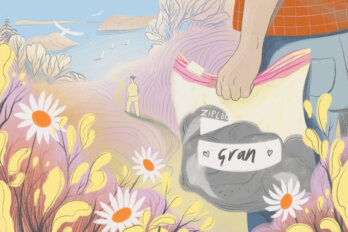What is the bro code? It’s a sound: loud frat boys bragging about their sexual conquests. A smell: cheap cologne, maybe Axe deodorant, hiding body odour. It’s a physical sensation: hands on your chest, shoving you. Asking you if you want to go. Asking if you want to go right now.
But all that posturing, all those signifiers, isn’t what’s especially toxic about bro code culture. It’s bro-ey, yes, and cringe, but it’s not codified. Women can act like bros too, and bros, regardless of gender, can be ultimately harmless. So often, bro culture is just empty swagger for a young man still trying to figure himself out, as young men have always had to. What’s harmful about bro culture is the hardening of these attributes into an idea, an ethos that’s distributed along strict lines—and enforced. What’s toxic about the bro code is the shared understanding that any and all masculine behaviour is worth valorizing while any and all feminine behaviour is worth denigrating. That male speech deserves repeating and all female speech deserves shouting over.
When enough people believe this kind of stuff and start acting in concert with each other, you get unbelievably bad outcomes. You get men hurting and harming the women around them and getting away with it. You get men behaving irresponsibly, dangerously, violently and being praised for it. You get men whose only politics is to uphold other men who think, look, talk, and act like them.
The bro code, functionally, works much the same way any system of cruelty and inequality works. It works by allowing a certain group of people to deny full personhood to anyone outside their circle, to shortcut around being a caring, empathetic human being. It works by making a group of people feel strong as they band together. But once they’ve banded together, it gives them licence—and, in fact, a desire—to be cruel to others.
So you get the old boys’ club. Business deals done on the golf course. Promotions handed out to the up-and-coming hotshot without a thought for seniority or fit or, often, merit. Logically and morally incoherent online articles that claim that “a bro is never allowed to drive in a drunken state. An exception can be made in the case of a bro who has acquired masters in the art of drunken driving.” You get spaces that are blander, poorer, emptier for the lack of gender diversity. And, surprising no one, when groups are formed without a thought to gender diversity—or, rather, in the spirit of erasing it—other forms of diversity tend not to flourish. In short, bro culture is a monoculture—an exaltation of one kind of masculinity, to its own detriment.
But how does bro code function, exactly? Why does it exist?
If you read up on the bro code in books or in online articles, you’re served with a variety of different messages about what it actually constitutes. Sometimes it forbids hitting on a bro’s sister, girlfriend, or ex; other times, there are loopholes. Sometimes it’s about helping your bros get laid; other times, it’s about ensuring they don’t get in trouble when they cross a line. Of course, any time one person sets out to write down what the bro code they swear by means, they’re leaving out another person’s version. But whatever the surface details, the core remains similar: loyalty to the bros.
In a 2020 article for Ms. magazine called “Bad Cops and Bystanders: How Male-Dominated Cultures Keep Men Silent,” written in the wake of the murder of George Floyd, Jackson Katz, a filmmaker and author, describes the role that a bro-code-like ethos plays in many all-male groups and organizations: “Whether it’s called a boy code, a guy code, or a bro code, a set of unwritten rules governs the behavior of individuals in all-male or male-dominated groups. This is especially true of groups engaged in aggressive competition and ‘us versus them’ battles with other groups—such as in sports and politics, and is even more pronounced in military or paramilitary organizations such as the police.”
Guys who buy into bro culture, according to sociologist Michael Kimmel in the 2015 documentary The Mask You Live In, get two things: “the bonds that are the most impermeable, the ones that will last you a lifetime.” And, he adds, they “also get the feeling that, ‘Girls can’t do this.’ So you get both horizontal solidarity with your bros, and hierarchy: ‘Men are superior to women.’”
As Kimmel puts it: “The most important dicta of the bro code is you never rat out the brotherhood. You never, ever betray that brotherhood. So this leads to the notion that, surrounding bad things, there’s a code of silence. What happens is their heads and their hearts actually come into conflict. Because their hearts may be saying, ‘This is wrong. I know this is wrong. My ethical compass tells me this is wrong. I should do something about it. A man would act.’ And on the other hand: ‘But these are my bros. I can’t betray them. If I do, they’ll marginalize me.’ This is the fear that so many men have that keeps them from acting ethically.”
The bro code is intended to protect guys at the expense of their female peers: sanctifying and covering up everything from mistreatment, emotional cruelty, and sexism to sexual assault, harassment, and rape. It’s not too hard, therefore, to see it at work in scandal after scandal in male-dominated environments—university football programs, junior hockey championship teams, police departments. The cases that make the headlines are an outcrop, the top of the pyramid of a system where harm to anyone outside your bubble is considered unimportant compared to the justified repercussions someone within your bubble is facing for committing that harm. This is the logical conclusion of bro culture, no matter how sick and horrifying it would be to most bros. If you build social structures around protecting one kind of person at the expense of everyone else, don’t be surprised when they work exactly as intended.
I saw it in action when I was in university. That’s what a few of the teachers who taught my undergraduate creative writing classes were like—a group of male friends who drank a lot and used their status to woo young women in their late teens and early twenties.
As there was nothing against teacher–student relationships in the university handbook at the time, this group of men zeroed in on young and ambitious female writers, pursuing new ones as each year brought a fresh crop of impressionable and starstruck undergrads to their courses. In their mid-thirties and forties, they watched each other date teenagers and twenty-year-olds—young women who were trying to make a place for themselves in a field where these men had established careers—and kept each other’s secrets.
Of course, men don’t have exclusive rights to the bro-code mentality. The circle-the-wagons precepts of the bro code can be embodied by people of any gender, and as women gain social power in certain spheres, their ability to use tactics like this to harm others will increase. Ultimately, what can be toxic about certain iterations of so-called woke cancel culture is also what’s toxic about bro-code culture. It’s privileging someone’s identity over their actual personhood; it’s making important, damning, harmful, difficult decisions according to the simple rubric of whether someone falls inside a group or outside it; it’s consigning someone to non-entity because it’s easier to do that than to reckon with the complexity of human interaction in its fullness.
The most critical function of bro culture is shielding people from the consequences of engaging in that exact kind of behaviour. For men, this is the logical continuation from behaviours inculcated in them as boys—that to remain silent is strong and masculine. In Raising Cain, Dan Kindlon and Michael Thompson write of the losses boys go through as they shift into their teen years and childhood gives way to adolescence. “Throughout these losses—of friendship, of trust, and of self-esteem—and the emotional shutdown required to achieve the Big Impossible of manhood, the culture of cruelty imposes a code of silence on boys, requiring them to suffer without speaking of it and to be silent witnesses to acts of cruelty to others. The power of this code is so strong, and it is such a pervasive part of the masculine identity, that boys take it for granted.”
It makes sense for young men to abide by the bro code as they watch or hear or simply learn about their fellow bros engaging in horrible acts. They’re scared. And it’s easier to stay silent, a kind of inertia, than to speak up, to set off a chain reaction of responses. Who knows where it might lead?
The bro code, with its unhealthy groupthink, relies as much on the silence of participants as it does on their agreement. It’s not a code that calls upon you to act so much as it’s a code that calls upon you to stifle your instinct to do something in certain specific situations.
But as Lundy Bancroft explains in Why Does He Do That?, individual men have more power to shift momentum than they realize—whether in a single conversation, in a group, or in a community. “If you are a man, your refusal to fall in step with destructive jokes and comments can be especially powerful,” he writes. “Men have a particularly important role to play in cultural change. When a father tells his son, ‘I don’t want to hear you saying bad things about girls’ . . . the boy sits up and takes notice.” Similarly, all it takes is one guy speaking up to immediately change the conversation—and with attitudes on sexual assault changing in recent years, one guy is likely to be supported by others.
In a 2017 story for AskMen called “What to Do When Your Friend Gets Called Out,” Kitty Stryker explains that “sexual abusers tend to surround themselves with people who will apologize for them, who will cover for them, who will defend them. They require camouflage in the form of a group of people who will confirm that the abuser is ‘such a nice guy.’ It’s how they can repeatedly get away with violating boundaries and how they can escape being outed or banished. It’s how they ensure their victims won’t be believed.”
In other words, without guys who provide that tacit support for guys who act badly, there is no bro culture. If the heavy silence at the bottom dissolves, the whole pyramid crumbles.
If there’s going to be anything like a code of brotherhood, a code of trust and genuine fraternity between men, it can’t be, “I will protect you when a woman you’ve hurt comes knocking.” Don’t be one of those guys covering for an abuser. Value doing the right thing over how you’re perceived. Value sticking to your guns and acting according to your principles over trying to maintain status with a clique of guys whose approval you crave. Value others—regardless of their gender, their race, their ethnicity, their sexual orientation—not because they belong to the right in crowd but because of who they are as people. Break the bro code.
Excerpted and adapted from The New Masculinity: A Roadmap for a 21st-Century Definition of Manhood by Alex Manley. © 2023 by Alex Manley. All rights reserved. Published by ECW Press Ltd.





